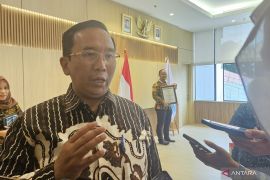During an online discussion here on Wednesday, Fitriani said that when it comes to pregnant women, exposure to air pollution can increase the risk of their giving birth to babies with low weight. This can lead to stunting in children and affect the growth of their organs as adults, she added.
"Meanwhile, in children, this can interfere with lung growth, body growth, and even cause stunting," she said.
In addition, exposure to air pollution can increase the risk of coughing, asthma, and hardening of the arteries in children if they have been exposed to pollutants since childhood, she pointed out.
Exposure to air pollution since childhood increases the risk of heart disease and asthma in adults. Other risks are the possibility of suffering a stroke at an early age or developing lung cancer, chronic obstructive pulmonary disease (COPD), and diabetes.
There is also the risk of a decline in the functioning of respiratory organs, such as lungs, dementia or senility, heart failure, and stroke.
According to Fitriani, based on the type, pollutants can be classified as gases and particles. Gases such as CO2 and CO can cause irritation and inflammation as well as shortness of breath, if there is a lack of oxygen.
Meanwhile, particles such as volatile organic compounds (VOCs) and Particulate Matter (PM) 2.5 can cause irritation, inflammation, and even cancer and respiratory damage.
PM 2.5 is thought to increase the risk of Acute Respiratory Infection (ARI) in people residing in big cities, including the capital city of Jakarta and its surrounding buffer zones, such as Bogor, Depok, Tangerang, and Bekasi.
"Because they can cause irritation, these particles and gases can cause acute problems such as watery eyes, stuffy nose, sore throat, itching, and coughing, as well as the risk of upper respiratory tract infections (URTI)," she said.
If the pollution particles are tens of micrometers in size, they can still be filtered out by the hairs in the nose. But if their size is smaller, the particles can enter the smallest air sacs or alveoli and then the bloodstream, which can be dangerous for health.
Fitriani said that living in areas with high pollution can cause the natural defense system of people's bodies to weaken.
Even if they recover from certain illnesses, their recovery will not be comprehensive and there will be a possibility of their developing other chronic diseases, she explained.
Therefore, she appealed to the public to play an active role in reducing sources of air pollution by not burning trash, switching to public transportation, adopting a clean and healthy lifestyle, and not smoking.
"Policy makers are also encouraged to immediately make laws and regulations related to air pollution reduction, and carry out cross-sectoral coordination with academics and professionals to improve air quality," the lung specialist said.
Related news: Air pollution can spur growth of cancer-causing carcinogens: PDPI
Related news: Minister issues instruction on air pollution control in Jabodetabek
Related news: BPBD outlines three methods to suppress air pollution in Jakarta
Translator: Lintang Budiyanti Prameswari, Katriana
Editor: Azis Kurmala
Copyright © ANTARA 2023











